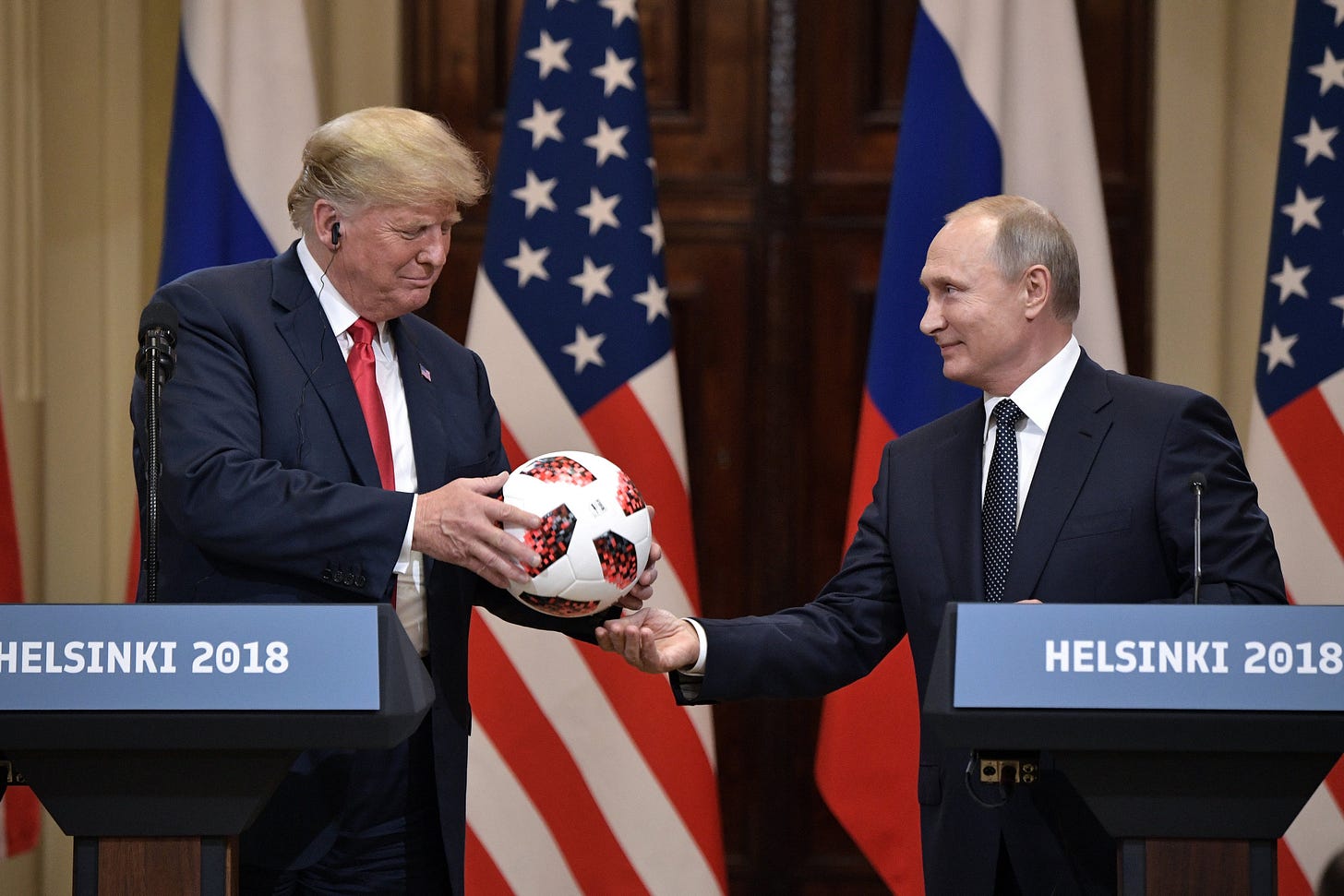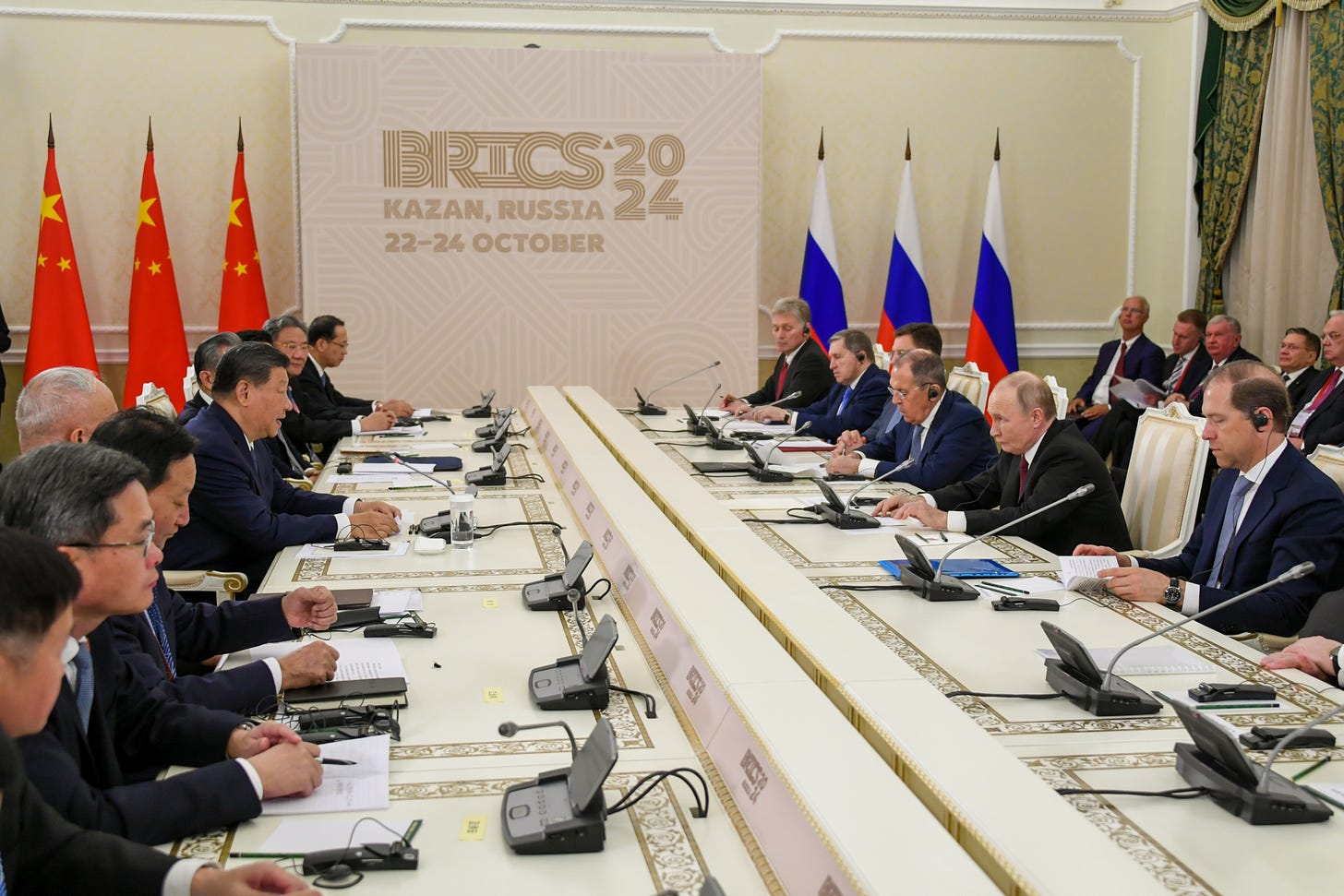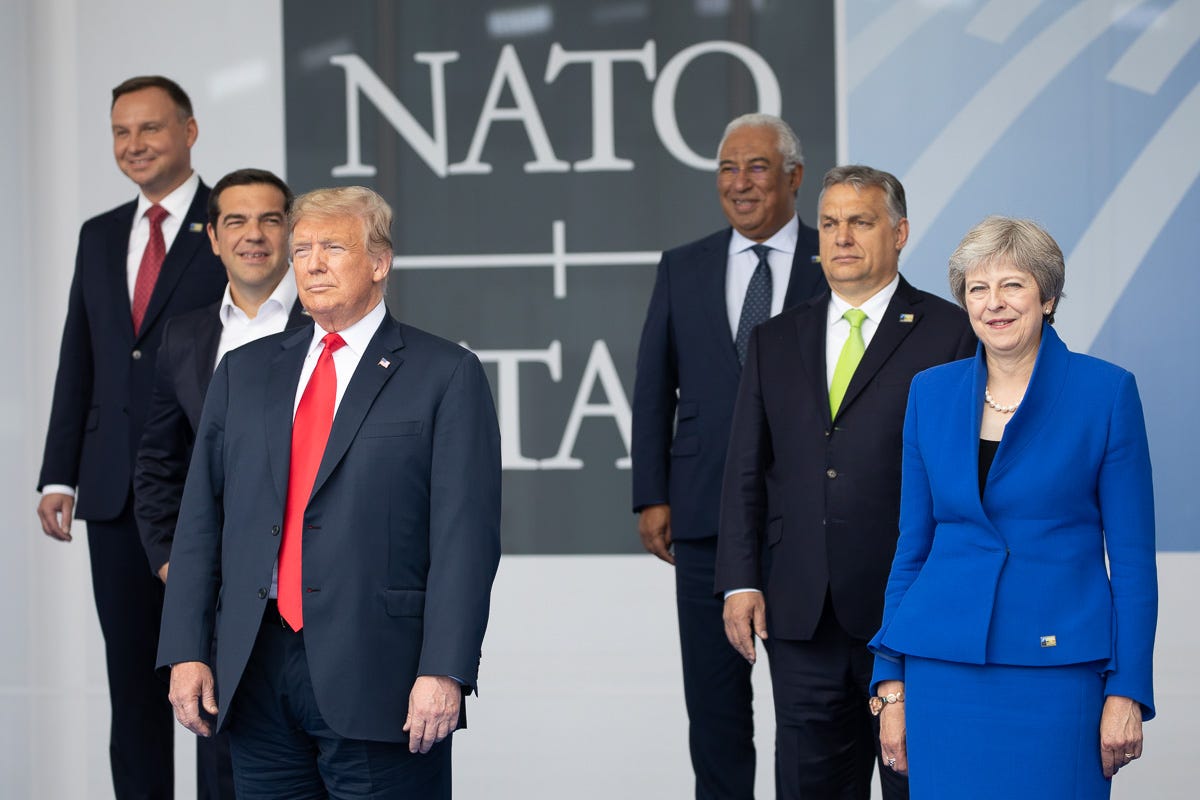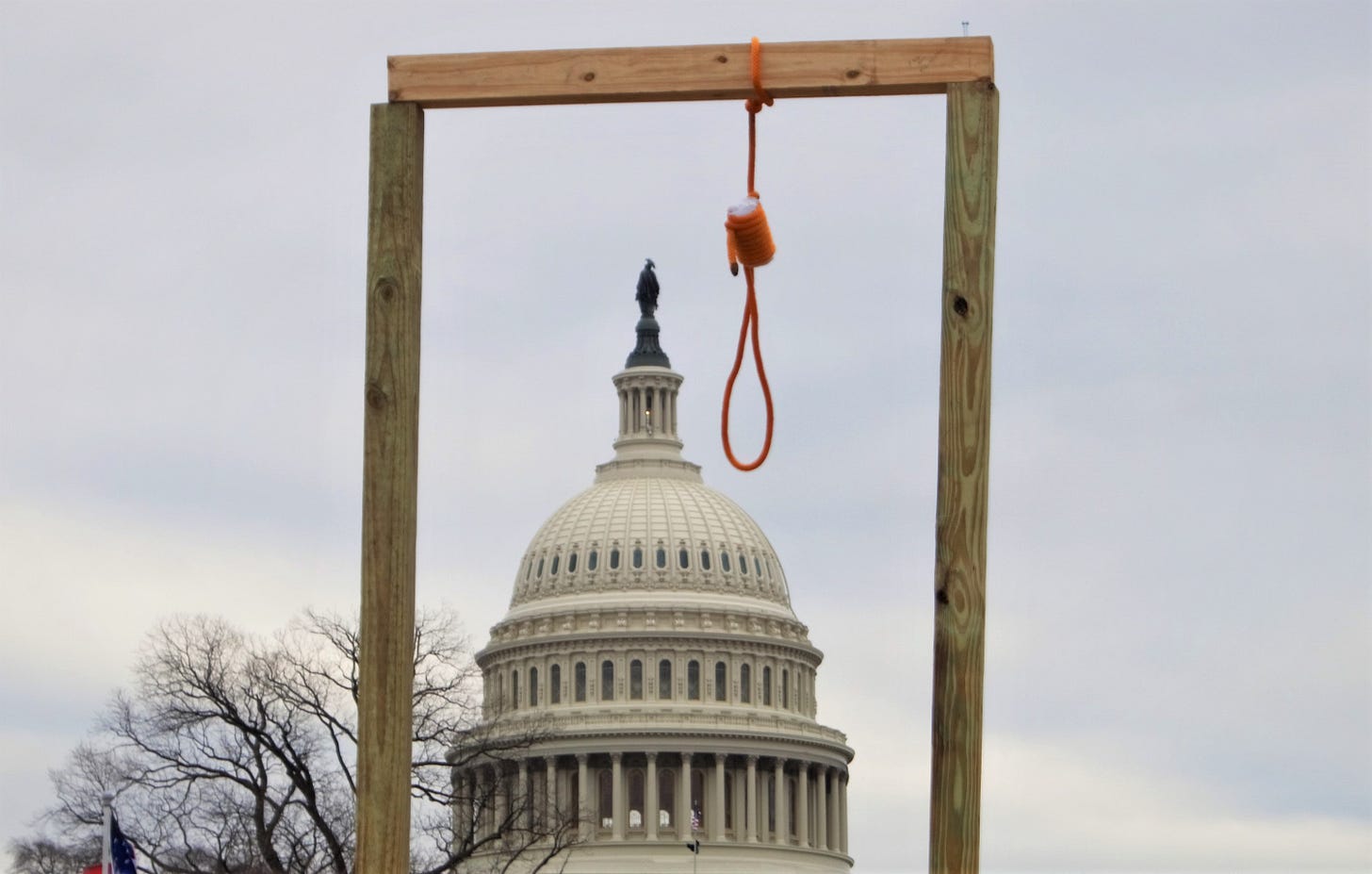The world according to Trump's gut
American foreign policy can't be entrusted to an arrogant and vengeful autocrat

During a recent interview, Donald Trump declared that the “enemy from within, in my opinion, is more dangerous than China, Russia, and all these countries.” This wasn’t the first time Trump claimed that his political opponents are doing more damage to the country than any geopolitical foe. A year and a half ago, he said the “greatest threat to Western civilization today is not Russia. It’s probably, more than anything else, ourselves.” Trump repeats different versions of this ugly declaration often, and he has even suggested that he’ll use the military against American citizens who resist him.
These statements expose the central — and inextricably related — features of Trump’s worldview: his authoritarianism and the dominant role of personal and political grievances in his decision-making. Recall the Helsinki summit in 2018, when Trump sided with Vladimir Putin over the U.S. intelligence community on Russian meddling in the election. When asked whether Russia was involved, Trump replied: “President Putin says it’s not Russia. I don’t see any reason why it would be.” There was only one reason for Trump to reject the consensus among intelligence agencies that Russia interfered in the election: he believed this assessment harmed him politically. So he embraced the brazen lies of a dictator over the accurate conclusions of American officials in front of the entire world.
Trump routinely insists that the “enemy within” — which includes U.S. intelligence services in many of his rants — will be his main focus in a second term. He argues that his political adversaries in the United States are “doing more damage to America than Russia and China could ever have dreamed” and says defeating them is the “monumental task for the next president.” He claims that these adversaries — such as “globalists” who support Ukraine — are “pretending to fight for freedom and democracy abroad, while they turn us into a third world country and a third world dictatorship right here at home.”
Trump’s warm personal feelings toward autocrats like Putin are no secret. He repeats Russian propaganda about how the United States and Volodymyr Zelensky are to blame for the war in Ukraine — another example of Trump turning his ire away from the real threats in the world and toward America and its allies. He described Putin as a “genius” immediately after the invasion began. Bob Woodward recently reported that Trump has been in regular contact with Putin since leaving office, possibly speaking with him as many as seven times over the past few years. He even sent Putin COVID tests when they were in short supply in the United States.
There are many other examples of Trump’s infatuation with authoritarian rulers. He describes Chinese President Xi Jinping as a “smart,” “brilliant,” and “perfect” leader who rules with an “iron fist.” During the George Floyd protests in 2020, he said the “Chinese generals would know what to do” — a glowing reference to the Tiananmen Square massacre in 1989. He often says he had “great chemistry” with Kim Jong-un, who he described as a “strong” and “very talented” leader who “loves his people.” During the debate with Vice President Kamala Harris in September, Trump touted an endorsement from Hungarian autocrat Viktor Orbán, who he described as “one of the most respected men . . . they call him a strongman.” Trump believes this is a compliment, and he boasted that the admiration is reciprocal: “Look, Viktor Orbán said it. He said the most respected, most feared person is Donald Trump.” Trump has taken his place in a global fraternity of autocrats, and he values their opinions and esteem more than the opinions of democratic leaders.
Trump celebrates dictators abroad because he wants to be a dictator at home. He has made “retribution” against the “deep state” a core focus of his campaign. He argues that the “deep staters” are part of a warmongering globalist elite that’s dragging the United States toward World War III and nuclear armageddon. He’s using fear to justify his authoritarian campaign to hollow out the government and replace nonpartisan civil servants, diplomats, and other officials with his own lackeys. Trump doesn’t want Americans to worry about Russia or China — he wants them to worry about their fellow citizens.
What makes Trump’s obsession with revenge even more alarming is that it warps his perception of threats the country actually faces. Trump will be more focused on purging government officials he perceives as disloyal and waging war on the “enemy within” than defending the country. He’s already demonstrated that he’s willing to undermine the United States’ national security for his own petty political purposes. He was impeached for withholding $400 million in military aid to Ukraine and pressuring Zelensky to open an investigation into Joe and Hunter Biden.
If Trump returns to the White House, American foreign policy will be subordinate to the chaotic whims and resentments of an increasingly unstable autocrat. This doesn’t just mean the Oval Office will be occupied by a president who sympathizes with dictators like Putin while attacking his own government and fellow citizens. It also means the United States will once again be shackled to an “America First” foreign and economic policy that will undermine its relationships with allies and trading partners and make the world a more dangerous place.
Trump’s worldview has always been a product of his grievances and pathologies. He regards alliances and trade agreements as strictly transactional, and he has long believed that the United States is a perennial “loser” in these relationships. This reflects his zero-sum view of the world — a view which underpins his most destructive policies.
For example, Trump has promised to impose a 20 percent tariff on all goods and a 60 percent tariff on Chinese imports coming into the United States — as well as specific tariffs that could range much higher (up to 200 percent on vehicles from Mexico, for instance). While he argues that tariffs will create a manufacturing boom and magically solve many of the United States’ economic problems without raising prices for American households, his reason for pushing them has little to do with the potential economic effects — either real or imagined.
Trump isn’t interested in scrupulously analyzing the economic consequences of policies like his across-the-board tariffs. These policies arise from a vague but visceral sense that the United States is being cheated — and the desire for revenge. “For many decades,” Trump declared during his inaugural address in 2017, “we’ve enriched foreign industry at the expense of American industry.” Since then, his conviction that the United States is endlessly getting “screwed” by its trading partners has only grown stronger. Trump’s tariffs would be economically calamitous. They wouldn’t just cause prices to surge dramatically (which would have a disproportionate impact on lower and middle-income households) — they would also incite retaliation among America’s trading partners, driving up prices even more and straining important political and economic relationships. Trump’s resentment toward other countries — which isn’t grounded in reality, as the United States has set the parameters of global trade for over three-quarters of a century — will inflict immense economic pain around the world.
Trump feels similarly bitter and resentful about America’s alliances. Earlier this year, he said Russia could do “whatever the hell they want” to NATO allies that haven’t spent what he deems to be enough on defense. Trump’s belief that NATO countries are exploiting the United States — and that Washington should stop paying for a large share of Europe’s defense needs — is one of the few political positions he has consistently held over the years. Trump has described NATO as “obsolete,” suggested that the United States wouldn’t honor the Article V collective defense provision of the NATO Charter, and repeatedly discussed withdrawing from the alliance entirely. Former National Security Advisor John Bolton says Trump is intent on getting out of NATO. And whether or not he ultimately does so, his advisors say he’s planning to drastically reduce the United States’ military support for Europe.
Trump’s plan to abandon Europe will have immediate existential consequences for Ukraine. If he wins in November, he has promised that his first act as commander-in-chief will be to call Putin and end the war in Ukraine in “24 hours.” This is impossible (as it assumes Kyiv has no say in the matter), and it indicates that Trump will tell Putin he’s free to keep all the territory he has stolen. Trump will likely also offer long-sought assurances to Moscow — like a pledge that Ukraine will never be allowed in NATO. This would reward Putin for the invasion and show him that Trump shares his contempt for Ukrainian sovereignty.
This total surrender — particularly from a president who is deeply hostile to NATO — would encourage Putin to test the boundaries and integrity of the alliance. One way he could do so is by sending troops into one of the Baltic states and daring NATO to uphold its commitment to collective defense. Trump has explicitly stated that he doesn’t understand why the United States should assist small NATO countries that are under attack. If Putin were to take military action without a forceful response from NATO, Article V would be permanently weakened — perhaps even destroyed. The time for Putin to take such a gamble would be during a Trump presidency.
Trump and his running mate Ohio Sen. J.D. Vance have made it clear that they regard Ukraine as a corrupt kleptocracy unworthy of American support. Trump cynically dismisses Zelensky as the “greatest salesman on Earth” for successfully lobbying for U.S. assistance, while Vance regurgitates Russian propaganda about how members of the Ukrainian government are using this assistance to pad their own pockets and buy yachts. It’s no wonder that Orbán (the most anti-Ukraine leader in the EU) is giddy about the prospect of a second Trump term. “He will not give a penny in the Ukraine-Russia war,” Orbán recently said.
A future Trump administration would attempt to eliminate all support for Ukraine, and this would have catastrophic consequences for global security. If Ukraine loses, Moscow will be emboldened to position itself as the defender of ethnic Russians in the Baltics and other countries across the region — a well-worn pretext for naked aggression and various forms of intensifying hybrid war. Putin would focus on rebuilding the Russian military and keeping Ukraine in the crosshairs. The populist right in Europe and the United States — from the MAGA wing of the GOP to AfD in Germany, Fidesz in Hungary, and National Rally in France — would be strengthened. While it’s difficult to imagine NATO countries going back to the pre-war status quo in terms of military spending, pro-Ukraine politicians in Germany, France, and the United States would come under attack. Isolationists would be on the offensive. Beijing would be delighted to see the United States humbled in Ukraine — a failure that would inevitably inform its decisions on military action in Taiwan.
Trump can’t fathom the existence of an international system based on anything more than personality and power. Unlike his predecessors, he has no appreciation for the achievements of a liberal international order that has been at the foundation of an unprecedented period of economic growth and political integration since World War II. He believes NATO is a protection racket, trade deals are schemes to sabotage and dominate partners as completely as possible, and that there’s no such thing as alliances based on shared democratic values — only fickle short-term interests.
Trump’s foreign policy is a natural outgrowth of his defective character. He believes everything is contingent and transactional — there are winners and losers in the world, and nothing else matters. This is why a second Trump term would be so dangerous. Despite all the evidence to the contrary, Trump has determined that the international order the United States has built and led over many decades makes it a loser. Presidents have more power and autonomy in the realm of foreign policy than they do anywhere else, and Trump would use this immense authority to undermine the liberal international order and empower America’s enemies.
At a time when the United States needs its democratic allies more than ever, Trump is intent on attacking and alienating them. He plans to “fundamentally reevaluate NATO’s purpose and NATO’s mission,” which could mean withdrawing from Europe, creating a two-tier system in which some allies don’t receive American security guarantees (depending on their military investments), or pulling the United States out of the alliance altogether. His proposal for a global trade war hasn’t been well-received in Europe, and the EU is planning to retaliate if he imposes tariffs. “We will hit back fast and we will hit back hard,” a senior European diplomat told Politico. European officials have learned their lesson since Trump’s first term, and they will make any trade war very painful for the United States — and American consumers.
While Trump’s foreign policy advisors and Vance claim that abandoning Europe is necessary to devote resources to confronting China, Trump’s approach to the United States’ East Asian allies is the same as his approach to NATO: coercive and unreliable. Taiwan must rely on the United States to deter China, and if Trump takes office in January, this will put Taipei in a much riskier position.
In a July interview with Bloomberg Businessweek, Trump complained about the United States’ security arrangements with Taiwan: “You know, we’re no different than an insurance company. Taiwan doesn’t give us anything.” He concluded that “Taiwan should pay us for defense.” Although Taiwan spends 2.5 percent of its GDP on defense (which is above the NATO baseline of 2 percent), Trump has argued that Taipei should quadruple spending to 10 percent — which would be over 80 percent of its national budget. Trump’s statement was panned by Taiwanese lawmakers, who observed that it would be financially and politically impossible to spend so much on defense (the U.S. spends less than 3 percent of its GDP).
It’s easy to imagine Trump using the United States’ trade deficit with Taiwan or his absurd notions about how much Taipei should invest in defense as an excuse to cut off or limit military support — a reminder that no American ally will be better off if he returns to the White House (he has demanded that South Korea pay for the United States’ protection as well). Trump’s grudges and personal animosity have led him to behave recklessly toward allies in the past. One of the clearest examples was his decision in the summer of 2020 to pull thousands of U.S. troops out of Germany. There was no strategic rationale for this decision — it was a product of Trump’s hostility toward Chancellor Angela Merkel and frustration with certain elements of German foreign policy.
Trump has suggested that Taiwan may be impossible to defend: “Taiwan is 9,500 miles away,” he told Bloomberg. “It’s 68 miles away from China.” Even if Trump maintains the American commitment to Taiwan, Xi will be paying close attention if the United States abandons Ukraine. This is why Taiwanese Vice President Bi-khim Hsiao (then the de facto ambassador to the United States) observed last year that “Ukraine’s success in defending against aggression is so important also for Taiwan.”
Authoritarian leaders around the world are increasingly cooperating with each other. North Korea has delivered millions of artillery shells to Russia, and now Pyongyang is even sending thousands of troops to support Putin’s war effort. Iran has provided Russia with thousands of drones and hundreds of short-range ballistic missiles. China has been a critical partner for Russia throughout the war, enabling Moscow to evade sanctions by providing it with many of the components necessary to manufacture weapons — often through the delivery of “dual-use” items that can be used commercially or militarily. Trade between Russia and China has surged by 64 percent since 2021. In 2023, Russia became China’s largest oil supplier while China became Russia’s biggest overall trading partner.

Earlier this month, Putin hosted the BRICS summit in Kazan, Russia — an event that brought dozens of world leaders together to demonstrate that Moscow isn’t as isolated as the West would like it to be. One theme of the event was the importance of moving beyond dollars and euros to, as Putin put it, “keep economic development free from politics as far as possible in the context of today’s world” (i.e., to reduce the impact of Western sanctions). Iranian President Masoud Pezeshkian described the BRICS as a “way out of American totalitarianism,” while Venezuelan President Nicolas Maduro called it the “epicenter of the new multi-polar world.” While Putin’s ultimate goal of creating a formidable political and economic challenger to the West won’t be realized for a long time, the expansion and formalization of the BRICS partnership is a sign that the authoritarian world is actively trying to recruit countries to an anti-Western coalition.
As authoritarian leaders increasingly work together, Trump wants to pull the global democratic coalition apart. While he argues that starting trade wars and attacking allies will put “America First,” no ideology underpins his reckless and belligerent approach to the rest of the world. This approach is a product of Trump’s instincts — his primal conviction that “winning” is all that matters and his shallow ideas about what constitutes victory.
Trump once said “my gut tells me more sometimes than anybody else’s brain can ever tell me.” There’s a reason Trump plans to fill his second administration with stooges who will do his bidding — he wants the freedom to follow his gut, whether that means deporting millions of people, using the power of the federal government to go after his political opponents, or pulling out of NATO. After a first term in which Trump’s craziest and most authoritarian plans were often thwarted by the adults in the room (such as Gens. Mark Milley and John Kelly, who are now warning about his authoritarianism), he’ll simply keep the adults out. The Atlantic’s Jeffrey Goldberg reports that Trump once declared: “I need the kind of generals that Hitler had. People who were totally loyal to him, that follow orders.”
Trump’s gut told him to send a fake slate of electors to Washington in an attempt to overthrow the 2020 election. It told him to order Georgia Secretary of State Brad Raffensperger to “find 11,780 votes, which is one more than we have.” After Trump lost the 2020 election, he called for the “termination of all rules, regulations, and articles, even those found in the Constitution.” He doesn’t believe in the rule of law. He doesn’t believe in the democratic norms and institutions that separate the United States from the dictatorships he admires so much — he views these norms and institutions as obstacles to be smashed instead of guardrails to be observed. There have been innumerable times when Trump’s gut told him to behave like a dictator, and he’s acting on this impulse more than ever.
The most destructive totalitarian systems of the twentieth century were also cults of personality. When the constraints on a ruler’s power are removed, that ruler’s personality becomes far more important because he can take more direct and immediate action. While there are still robust institutional defenses that would restrain Trump in a second term, many of those defenses have been weakened. The Supreme Court has granted the president broad immunity from prosecution for any act that can be construed as “official.” Speaker of the House Mike Johnson helped Trump in his effort to overturn the 2020 election. It’s possible that the GOP will soon be in control of both chambers of Congress, and Trump will be quicker to punish dissent within the party than ever before if he wins a second term.
While Trump’s tariffs and his hostility toward alliances would severely damage and diminish the United States on the international stage, his attack on American democracy is simultaneously the biggest threat to the country at home and abroad. When Trump’s insurrectionists stormed the Capitol on January 6, 2021, America’s allies were horrified while our enemies rejoiced. Then-future British Prime Minister Keir Starmer decried the “horrendous scenes” from Washington, which he called a “direct attack on democracy and legislators carrying out the will of the American people.” Then-future German Chancellor Olaf Scholz said it was a “disgrace” that Trump undermined the peaceful transfer of power by “inciting violence and destruction.” Dutch Prime Minister Mark Rutte (now the secretary general of NATO) described the insurrection as “horrible.”
The reactions of America’s enemies were even more revealing. Chinese state media declared that the insurrection exposed the instability of democracy, while Beijing’s foreign minister jeered at the United States for supporting the pro-democracy movement in Hong Kong — which she compared to January 6. In the weeks that followed, Chinese propaganda groups published films about how the United States had become a “failed state.” On the one-year anniversary of January 6, a spokesman for the Chinese foreign ministry said the United States should “face up to its own ‘democracy deficit’ and respect the right of all countries to explore and develop a democratic path that suits their own national conditions.” Russian Foreign Ministry spokeswoman Maria Zakharova said January 6 proved that the “U.S. electoral process is archaic” and “does not meet modern standards.” Iran’s Supreme Leader Ayatollah Ali Khamenei crowed that American values are “ridiculed even by their friends.”
There’s only one man responsible for this grim day in American history. After setting the insurrection in motion, Trump spent hours watching it on TV as his senior staff and family members pleaded with him to intervene. As rioters chanted “hang Mike Pence,” Trump sent out a tweet about his vice president’s cowardice for refusing to decertify the election results. Now Trump describes the rioters who were tried and convicted as “hostages” and “political prisoners,” plays a recording of the defendants singing the National Anthem from their jail cells at his rallies, and calls January 6 a “day of love.” Instead of being chastened by the spectacle of his supporters storming the Capitol, hunting down public officials, and attacking police officers, Trump is emboldened by it. There’s no greater warning to America than that.
January 6 was the day the United States was remade in the image of Trump. It was a day when all the rage, paranoia, and dishonesty of the Trump presidency erupted like a geyser in the middle of the nation’s capital. In a recent interview with the New York Times, Gen. John Kelly — Trump’s longest-serving chief of staff — said Trump meets the definition of a fascist. He concluded the interview by urging Americans to cast their votes on the basis of character over policies. But in Trump’s case, the character and policies are often one in the same.





